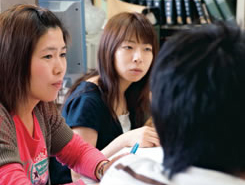Economic Theory and Policy Course
 Aims to develop theory-based practical policymaking and evaluation abilities
Aims to develop theory-based practical policymaking and evaluation abilities
In the Economic Theory and Policy Course, students learn not only basic theories of economics, but also how to formulate and evaluate specific economic policies. By learning economic theories, the actual execution process of policies and their evaluation approaches all at the same time, students fully experience the excitement of economics.
Examples of Topics for Graduation Thesis
Design and incentive compatible regulations of the CO2 emissions trading market; postal service privatization and structural reform; structure of unequal society; current situation and challenges of finance for small and medium-sized enterprises; green tourism based on broad cooperation, etc.
Career Options after Graduation
National/local public officer, finance/insurance, manufacturing, services, wholesale/retail, corporate planning and development division, graduate school studies, etc.
Obtainable Qualifications
Degree/BA (in economics), first-class junior high school teaching certificate (in social studies) and first-class senior high school teaching certificate (in civics)
* Can be obtained only if the required number of credits has been earned.
Main subjects offered in the Course (from the second to fourth year)
- Public Finance A & B: Lectures focus on how to interpret and approach finance while following traditional financial systems and addressing familiar and recent issues at the same time, without excessively dwelling on the details.
- Economic Policy A & B: While Economic Policy A focuses on the principles of economic and fiscal policies, Economic Policy B examines the effects, mechanisms, and political nature of the past major policies of Japan.
- Local Public Finance A & B: On the basis of knowledge about current Local government finance system in Japan, reform issues and trends under the decentralization are discussed.
- Economic Theory I A & B: Functions and limits of market mechanisms are introduced to promote a better understanding of the effectiveness of economic theory and policy.
- Theories of Business Cycle A & B: The process of change in capitalist economies is analyzed in terms of theory, stage, and current situation, through which student understanding of the true nature of capitalism is deepened.
- Culture, Sport and Modern Life: Delicate and complicated mutual relations between cultural events and the economy in modern society are discussed to deepen student understanding of cultural economics.
- Economic Theory II A & B: This course provides the basic concepts of macroeconomic variables such as gross domestic product, price indices and unemployment. Moreover, students will study the effectiveness of fiscal and monetary policies by introducing the basic model of macroeconomics.
- Banking and Financial System A & B:
- Regional Economics A & B:
- Household Economics A & B: Social and economic issues related to our lives, especially focusing on the difference between paid work and unpaid work, are examined from the viewpoints of gender and class.
- Economic Statistics A & B: Statistical information reduction or descriptive methods are explained for economics and management.
- Contemporary Capitalism A & B: Contemporary Capitalism A & B: This course lectures on the methods for understanding the historical 'evolution' of modern varieties of capitalism and the theoretical tools for analyzing it.
- Environmental Economics A & B: Contemporary environmental issues are addressed, their causes are economically elucidated, and policies that can solve these issues are explored.
- Social Policy I & II: Social issues, such as the reasons for the increase in the number of temporary and part-time workers, while full-time employees are overworked, are addressed and possible solutions are explored.
- Social Security I & II: The reason why a social security system different in nature from market mechanisms could exist in the market economy is addressed through health care, pension, nursing, and welfare systems and policies.
- Theory on Modern Sports: The impact of sports culture on the economy and urban development in today's society is examined.
- Applied Econometrics A & B: Students will study quantitative methods for the analysis of a modeled society and economic phenomena and then examine the results of the analyses for application to the real world.
